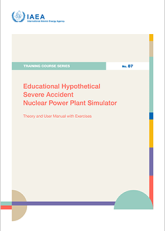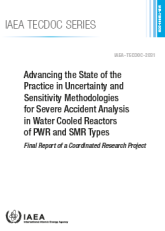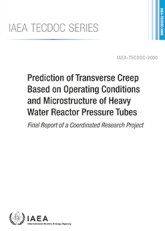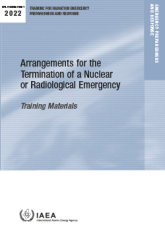Description
The IAEA facilitated the co-operation on research and development among its Member States on the development and validation of computer codes for the design and safety analysis of nuclear power plants. The main objective of this effort was to bring together the current state-ofknowledge on uncertainty propagation in severe accident analyses that has been accumulated by experienced analysts with the aim of increasing the sophistication and competency of the practitioners in this field. This publication provides the contributions from four individual organizations from four Member States describing their employed uncertainty and sensitivity assessment methods applied in simulating the QUENCH-06 experiment performed at the Karlsruhe Institute of Technology (Germany) in December 2000. The QUENCH-06 experiment was designed to explore the behavior of nuclear fuel under oxidizing and quenching conditions during severe accident scenarios in light water nuclear reactors. Due to its comprehensive nature, this experiment was chosen as the benchmark for evaluating the performance of severe accident codes employed by participants in this coordinated research project. This publication is intended for nuclear engineers, researchers, code developers, experimentalists in nuclear energy fields, reactor vendors and developers, university professors and students, regulatory experts, and nuclear power plant planners.
More Information on reusing IAEA copyright material.
Keywords
Advancing the State of Practice, Uncertainty, Sensitivity Methodologies, Severe Accident Analysis, Water Cooled Reactors, QUENCH-06 Experiment, Nuclear Accidents, Nuclear Facilities, Safety Measures, Experiments, Member States, Validation, Computer Codes, Design, Safety Analysis, Nuclear Power Plants, Uncertainty and Sensitivity Assessment Methods, Karlsruhe Institute of Technology, Nuclear Fuel, Oxidizing, Quenching Conditions, Severe Accident Scenarios, In Light Water Nuclear Reactors, Benchmark, Severe Accident Codes, Coordinated Research Project, CRP, Nuclear Engineers, Code Developers, Reactor Vendors, Calculations, Corresponding Results, Calculation Framework, Sensitivity Analyses, Sensitivity Exercise, QUENCH-06 Models, Integral Codes, Participating Organizations, Scope of the Analysis, Results Obtained, Main Outcomes, Lessons Learned, Conclusions, Uncertainty Parameters, Numerical Test Problem Specifications, Results of Nominal Case, Heating-Up Phase, Pre-Oxidation Phase, Quenching Phase, Best Practises, Individual Reports, Countries, Review
Related publications

2025

2025

2024

2024

2024

2024

2024

2024

2023

2023

2023

2023

2023

2022

2022

2022

2022

2022





















